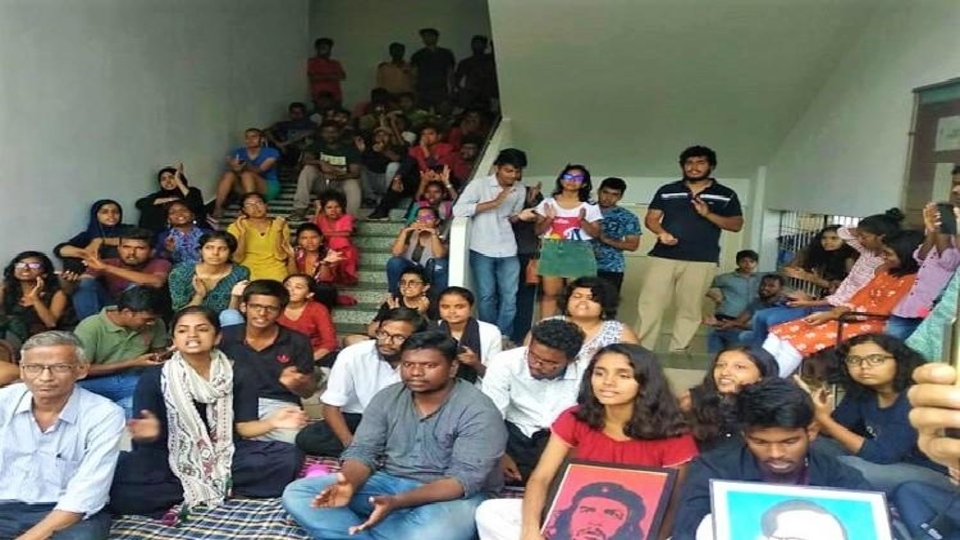The students and faculty of an elite institution in India face uncertainty after the administration decided to suspend all academic activity shortly after the beginning of the academic year. On July 15, the administration of the Tata Institute of Social Sciences (TISS) decided to close its Hyderabad campus sine die after students protested the arbitrary hike in mess charges and attempts at privatization.
The students started their strike after initial attempts at negotiation failed on July 9. Earlier, the TISS administration made a sudden decision to increase the hostel fee from INR 15,000 (USD 219) to INR 54,000 (USD 787) from the current semester. Students complained that this increase was done without their consent and in an arbitrary fashion with the intent to privatize. Simultaneously, the private service provider who has the contract for food and hostel facilities demanded that students pay the entire amount of hostel and mess fees for each semester at its beginning. The non-fulfillment of the payment prohibits students from joining the hostel. Several students belonging to the minority Scheduled Caste and Scheduled Tribe categories (those belonging to castes once considered untouchable and students from indigenous communities) were among the first to get affected by this rule and were forced to drop out. A large number of students in TISS come from the poor and marginalized sections of society. These rules infuriated the students who began protesting.
In the beginning, the students blockaded the premises, preventing the entry of the staff and the commencement of classes under the umbrella of Students Action Committee (SAC). When the administration failed to listen to their grievances even after five days of protests, as many as 13 students went on hunger strike on July 14.
Meanwhile, the administration called the police into the university premises which further infuriated the students. With a lot of scrutiny and patrolling, the atmosphere became very intimidating for the students. The agitating students claimed that even after two among them who were on hunger strike were hospitalized, no one from the administration turned up to check on them or negotiate. They expressed their determination to continue the protest till their demands were met.
However, on the second day of hunger strike, the administration decided to shut down the campus. In its notice, the administration claimed that a consensus had been reached in a meeting between the administration and the students who are on government scholarships and a decision was taken to resume classes from the next day. However, some students deliberately prevented the agreement from being implemented, the administration claimed, adding that in such a situation, it was forced “to close down [the campus] indefinitely”.
However, a large number of students belonging to the Scheduled Castes and Scheduled Tribes categories who were present at the meeting confirmed that they had not accepted the offer. Despite this, the deputy director forwarded an email, claiming to have reached a consensus directly with these students. She asked the Students Action Committee (SAC), a students’ body that was formed last year and is leading the agitation, to call off the strike.
“The meeting, which has been referred to in the notice, was also a clear attempt to cut out the SAC and speak directly to a selected group of students who could be intimidated to accept the administration’s point of view,” students privy to this meeting said.
One of the employees familiar with the developments told NewsClick that the notice by the management has disturbed the entire TISS community. “The administration, during the whole course of 7-8 days since the protests started, stuck to its guns and did move even an inch from its original position,” the employee said.
The students have also approached the court on this issue.
On July 17, more than a 1,000 signatories, including professors, alumni, students and activists, issued a public statement in support of the agitating students and asked the TISS administration to revoke the sine die notification and open the institution.
The statement that it was worrying that instead of engaging with the burning question of diversity and inclusivity in academic spaces, the TISS administration had chosen to shut down the institute. It added that this is despite the fact that the protests were democratic and peaceful in nature. At a time when the state is withdrawing from higher education, it is appalling that an institute with a long and cherished history of working towards social justice has chosen to absolve itself of the responsibility of providing equitable access to education, the statement added.
“We demand that the TISS administration revoke the sine die immediately, and take all steps necessary to ensure that students from marginalized communities can avail of hostels and other amenities,” G. Arunima, a professor at the Center for Women’s Studies at Jawaharlal Nehru University, New Delhi, said.
Tata Institute of Social Sciences (TISS) is a public-funded multicampus deemed to be a university and is headquartered in Mumbai. It mostly offers interdisciplinary masters courses. In recent years, due to the effect of the government’s policy of privatization of education, its management has allegedly pulled back from its commitment towards sections of students who cannot afford their education and activists have pointed out that the institution is turning into a profit-making enterprise. A section of progressive teachers and students have constantly opposed this transformation and the current agitation is a part of that larger resistance.





